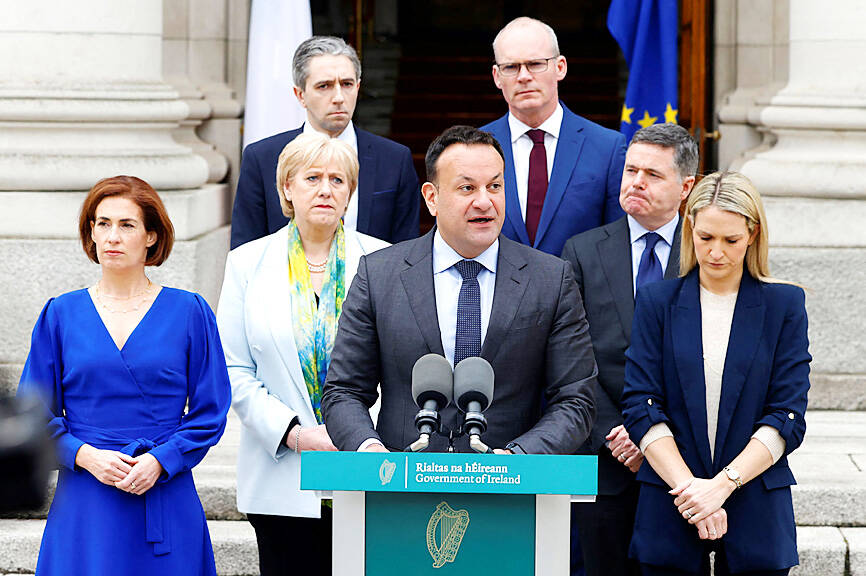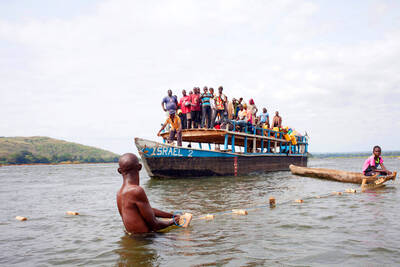Leo Varadkar on Wednesday announced that he was stepping down as Ireland’s prime minister and leader of the Fine Gael party in the governing coalition, citing “personal and political” reasons.
Pundits called the surprise move, just 10 weeks before Ireland holds European Parliament and local elections, a “political earthquake.”
A general election has to be held within a year.

Photo: Reuters
Irish Deputy Prime Minister Micheal Martin, leader of Fianna Fail, the main coalition partner, said Varadkar’s announcement was “unexpected,” but added that he expected the government to run its full term.
An emotional Varadkar, who is in his second stint as prime minister and at 45 remains one of Europe’s youngest leaders, said he felt he was no longer the “best person” to lead the country.
“Politicians are human beings. We have our limitations,” he said in a statement on the steps of Government Buildings in Dublin, surrounded by his Fine Gael Cabinet colleagues.
“We give it everything until we can’t anymore and then we have to move on,” he said.
Despite recent poor showings at the ballot box, Varadkar said that he believed the government could be re-elected.
However, he added: “I believe a new taoiseach [prime minister] will be better placed than me to achieve that — to renew and strengthen the top team, to refocus our message and policies, and to drive implementation.”
“After seven years in office, I am no longer the best person for that job,” he said.
“My reasons for stepping down now are personal and political, but mainly political,” he said, without elaborating.
Earlier this month, Varadkar was widely blamed for a twin defeat, including the biggest-ever referendum loss by a government, on proposals to reform references to women, the family and care in the Irish constitution.
Varadkar said his center-right Fine Gael party would have a leadership contest, and that he would remain as prime minister until the new leader is elected, after parliament returns from recess next month.
Varadkar first became prime minister in June 2017. He was the youngest person to ever hold the office, Ireland’s first openly gay prime minister and the first from an ethnic minority background.
He stepped down as part of a deal with opposition parties after his party’s poor performance in the 2020 general election, but took over for a second time in 2022 as part of the same agreement.
Varadkar, a pugnacious and sometimes controversial speaker in parliament, was in charge of Ireland’s response to the COVID-19 pandemic and during Brexit negotiations, where he helped prevent a hard border with UK-run Northern Ireland.
Fine Gael has lost five recent by-elections, leading some insiders to see Varadkar as an electoral liability. Ten of the party’s lawmakers have announced that they do not plan to stand at the next election.
“His legacy will be that of an electoral loser. He promised to be a good communicator, but it turned out he was bad at it. He had no clear agenda, and delivered little,” said Eoin O’Malley, a political scientist at Dublin City University.
In London, British Prime Minister Rishi Sunak’s spokesman said of Varadkar: “We wish him well on his next steps and we’ll continue to work closely with him as a successor is sought.”
In the city of Monaghan, few people told Agence France-Presse that they regretted his departure.
“I don’t think it’s a big loss,” 37-year-old accountant Caron McKenna said.
Francis Meehan, a 66-year-old council worker, hailed Varadkar’s handling of the COVID-19 crisis.
“Of course his experience as a medical doctor shone out,” he said.
Varadkar’s potential successors include Cabinet ministers Simon Harris (education), Simon Coveney (trade) and Helen McEntee (justice).
Political analysts said an election was not expected in the wake of the announcement, though opposition parties lined up to demand a vote.
Sinn Fein’s leader, Mary Lou McDonald, urged Varadkar to call an early election, saying it was “unthinkable” that a “conclave” of Fine Gael politicians decide the next prime minister.

‘IN A DIFFERENT PLACE’: The envoy first visited Shanghai, where he attended a Chinese basketball playoff match, and is to meet top officials in Beijing tomorrow US Secretary of State Antony Blinken yesterday arrived in China on his second visit in a year as the US ramps up pressure on its rival over its support for Russia while also seeking to manage tensions with Beijing. The US diplomat tomorrow is to meet China’s top brass in Beijing, where he is also expected to plead for restraint as Taiwan inaugurates president-elect William Lai (賴清德), and to raise US concerns on Chinese trade practices. However, Blinken is also seeking to stabilize ties, with tensions between the world’s two largest economies easing since his previous visit in June last year. At the

UNSETTLING IMAGES: The scene took place in front of TV crews covering the Trump trial, with a CNN anchor calling it an ‘emotional and unbelievably disturbing moment’ A man who doused himself in an accelerant and set himself on fire outside the courthouse where former US president Donald Trump is on trial has died, police said yesterday. The New York City Police Department (NYPD) said the man was declared dead by staff at an area hospital. The man was in Collect Pond Park at about 1:30pm on Friday when he took out pamphlets espousing conspiracy theories, tossed them around, then doused himself in an accelerant and set himself on fire, officials and witnesses said. A large number of police officers were nearby when it happened. Some officers and bystanders rushed

Beijing is continuing to commit genocide and crimes against humanity against Uyghurs and other Muslim minorities in its western Xinjiang province, U.S. Secretary of State Antony Blinken said in a report published on Monday, ahead of his planned visit to China this week. The State Department’s annual human rights report, which documents abuses recorded all over the world during the previous calendar year, repeated language from previous years on the treatment of Muslims in Xinjiang, but the publication raises the issue ahead of delicate talks, including on the war in Ukraine and global trade, between the top U.S. diplomat and Chinese

RIVER TRAGEDY: Local fishers and residents helped rescue people after the vessel capsized, while motorbike taxis evacuated some of the injured At least 58 people going to a funeral died after their overloaded river boat capsized in the Central African Republic’s (CAR) capital, Bangui, the head of civil protection said on Saturday. “We were able to extract 58 lifeless bodies,” Thomas Djimasse told Radio Guira. “We don’t know the total number of people who are underwater. According to witnesses and videos on social media, the wooden boat was carrying more than 300 people — some standing and others perched on wooden structures — when it sank on the Mpoko River on Friday. The vessel was heading to the funeral of a village chief in